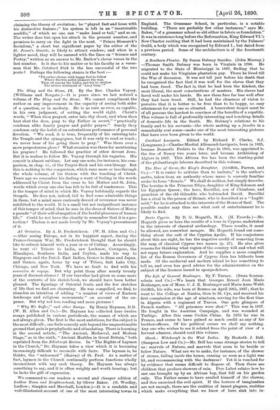"Why We Suffer," and other Essays. By Henry Hayman, D.D.
(W. H. Allen and Co.)—Dr. Hayman has collected here twelve essays published in various periodicals, the names of which are not always given. The first is the most ambitious, for the subject is the most difficult; one feels scarcely safe beyond the unquestionable ground that pain is prophylactic and stimulating. There is learning in the second article, "The Ancient, Mediwval, and Modern Stage," as in the sixth, "Ancient Marbles in Great Britain," both reprinted from the Edinburgh Review. In "The Rights of Laymen in the Church," Dr. Hayman takes a view which it is becoming increasingly difficult to reconcile with facts. The layman is, he thinks, the " unlearned " (15ntrrns) of St. Paul. As a matter of fact, laymen in the Church continually perform functions wholly inconsistent with any such theory. Dr. Hayman has always something to say, and it is often weighty and worth hearing; but he lacks the gift of expression.
We commend to our readers a second and cheaper edition of Ludlow Town and Neighbourhood, by Oliver Baker. (G. Woolley, Ludlow; Simpkin and Marshall, London.)—It is a readable and well-illustrated account of one of the most interesting towns in
England. The Grammar School, in particular, is a notable building. "There are probably few other instances," says Mr. Baker, "of a grammar school so old either in fabric or foundation." It was in existence long before the Reformation, King Edward VI.'s New Charter reciting that it had been maintained by the Palmers' Guild, a body which was recognised by Edward I., but dated from a previous period. Some of the architecture is of the fourteenth century.


































 Previous page
Previous page